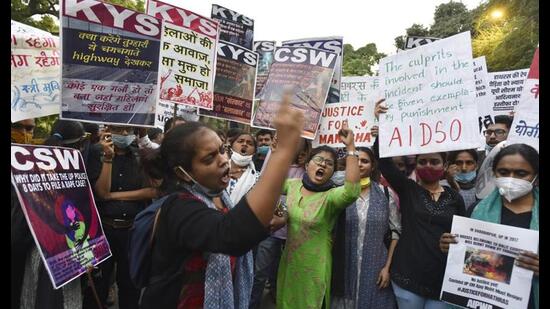Hathras gang rape: Justice for the Dalit victim and her family is crucial
Despite a strong and powerful act to protect the rights of marginalised communities facing structural inequalities, the victim did not get justice
The gang rape and murder of a young Dalit woman in Uttar Pradesh’s Hathras district sparked nationwide outrage, but earlier this month, three of the four accused men were acquitted of all charges. While understanding the legal aspects, it’s important to understand the role of the police and the criminal justice system. The politics around this case also needs to be considered.

It is important to remember that the victim hailed from the lowest caste that faces extreme forms of caste-based discrimination and violence. Hence, it was hoped that the verdict would send a strong signal to society. But that didn’t happen. The answers lie in the infirmities in the legal and investigative processes in the immediate aftermath of the crime.
The First Information Report (FIR) in the case was not even drafted properly by the local police, and was written without any mention of sexual violence against the victim. Why was the victim not given proper medical treatment immediately? Why were several Indian Penal Code provisions such as Section 34 (common intention), Section 120(B) (criminal conspiracy), Section 506 (criminal intimidation) not invoked, even if belatedly? Why were sections 3(1) (w) (i) (intentionally touching Scheduled Caste or Scheduled Tribe woman without her consent) and section 3(1) (w) (ii) (using words or gestures of a sexual nature towards a Scheduled Caste or Scheduled Tribe woman) of The Scheduled Castes and Scheduled Tribes Prevention of Atrocities Act not invoked, despite the victim’s statement given to the police on September 22, 2020? Why did it take so long for the police to invoke IPC section 376 (D)?
In the verdict, the court said that there was ambiguity on whether the victim was gang raped. Some of the confusion stemmed from the first FIR registered after the incident, which made no mention of a sexual crime, and the delay in the initial medical examination of the victim, which was not done until the day she recorded her statement on September 22, which would go on to become her dying declaration. The delay in the medical test also did not bring evidence about the gang rape on record.
There are lots of gaps in the trial of this case.
Under the SC/ST act, the judgment should have been announced within two months of the incident, but it took over two years. The written representation of the victim’s family for the transfer of the case to Delhi was not entertained by the high court. The case trial went through challenges, where the members of the community the accused men belonged to organised protests, and reportedly threatened the lawyer of the victim’s family. The role of the public prosecutor also needs to be reviewed.
The caste of the accused men also needs to be taken into consideration.
The victim’s family said that their village had seen a high extent of caste-based discrimination. The Valmikis (the caste of the victim) were four families in a village of 300-odd households, and the family told reporters they were told to remain in the village by the two main dominant castes, the Brahmins and the Rajputs, to keep the area clean while the other scheduled castes community, Jatavs, moved out a long time ago. The psychological pressure and trauma that the victim and her family members must have gone through are unimaginable, and hence justice for them remains crucial.
Unfortunately, despite a strong and powerful act to protect the rights of marginalised communities facing structural inequalities, this was not achieved, strengthening false notions of caste supremacy and discrimination.
Manjula Pradeep is an anti-caste activist.
The views expressed are personal.

All Access.
One Subscription.
Get 360° coverage—from daily headlines
to 100 year archives.



HT App & Website






